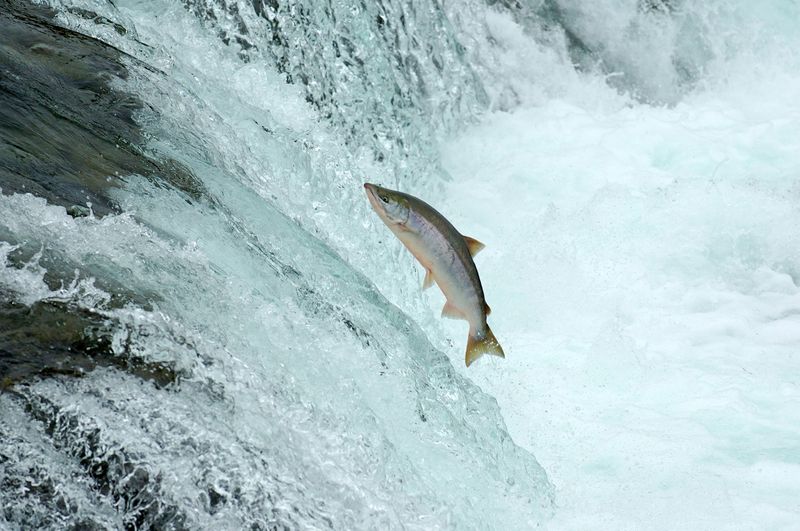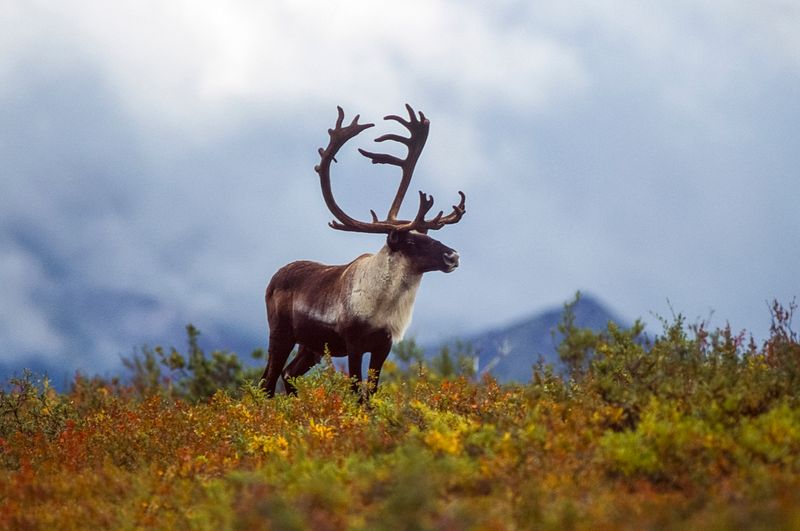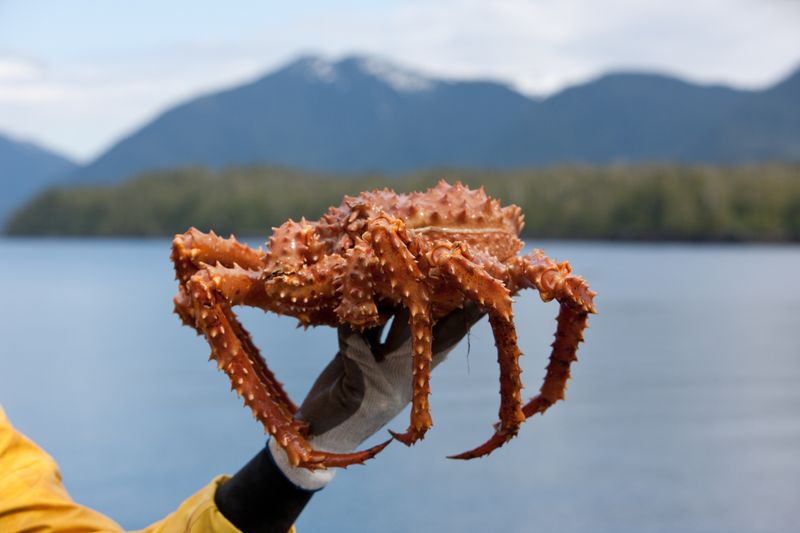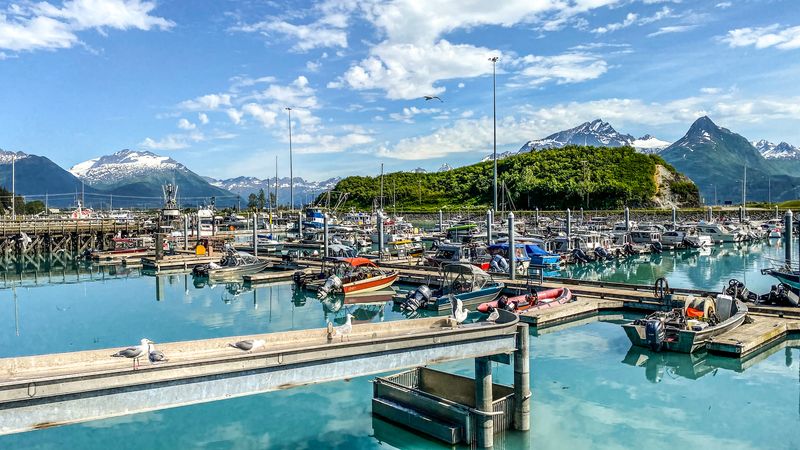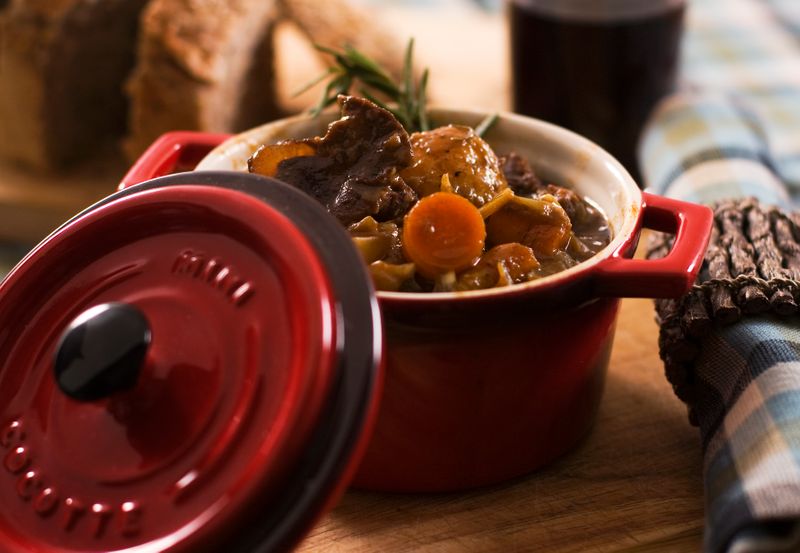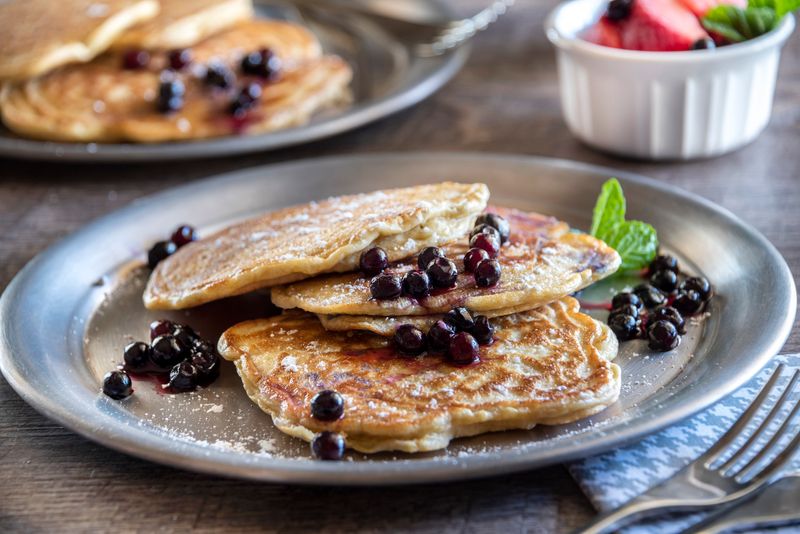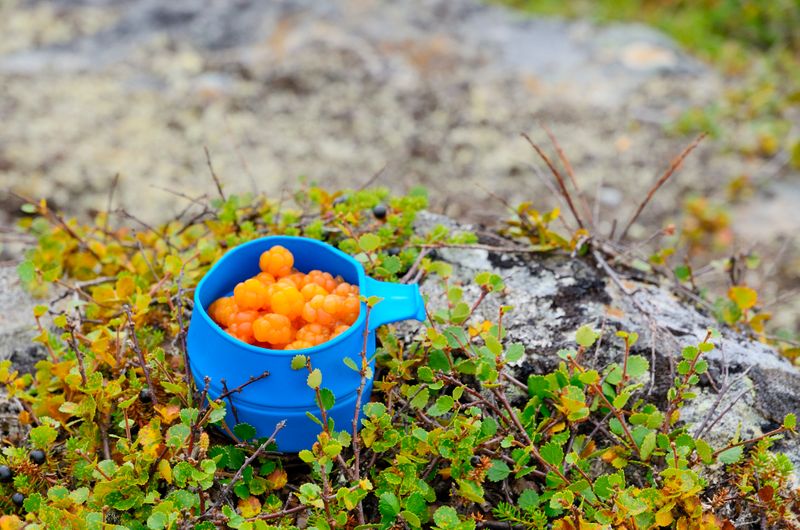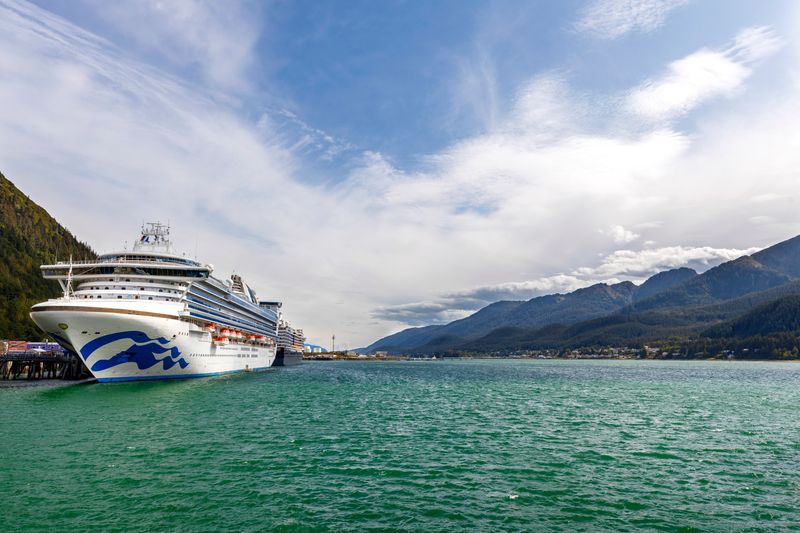Take one bite of Alaskan cuisine, and you'll be tasting the story of America's last wild frontier. The 49th state boasts a coastline that stretches an astonishing 10,686 kilometres (6,640 miles), where Pacific waters crash against jagged shores and nurture some of the planet's richest fishing grounds. Here, the legendary Alaskan king crab reigns supreme, its sweet meat prized by chefs worldwide, while countless salmon fight their way upstream each year in one of nature's most spectacular migrations.
Venture beyond the shoreline, and Alaska reveals its other culinary treasures. In a land where winters stretch long and summers burst with 20-hour days of sunshine, food isn't just sustenance—it's survival art. Generations of Athabascan, Yupik, and Inuit peoples have passed down techniques for transforming the wilderness bounty—whether it's turning caribou into jerky that sustains through snowbound months or whipping berries with fat into cloud-light akutaq. Russian fur traders left their mark with hearty breads, while gold rush sourdoughs created pancake traditions that still grace breakfast tables today.
What emerges is a cuisine as rugged and surprising as the landscape itself—where the world's freshest seafood might share a plate with foraged spruce tips or reindeer sausage, and where eating locally isn't a trend but the only way Alaskans have ever known. Here are seven must-try local dishes that showcase the authentic flavours of Alaska, from the iconic Alaskan king crab to lesser-known delicacies that tell the story of this remarkable state.
1. Wild salmon: Alaska's prized catch
Alaska's cold, pristine waters produce some of the world's finest wild salmon. Five species—king (Chinook), sockeye (red), coho (silver), pink (humpy), and chum (dog)—make their annual spawning runs through Alaska's rivers, creating not just a spectacular natural phenomenon but also the foundation of the state's cuisine.
Fresh wild salmon from Alaska offers a rich, buttery texture and complex flavour that farm-raised varieties simply can't match. The fish's natural diet of krill and smaller fish gives wild salmon its distinctive deep orange-red colour and high omega-3 content.
Salmon preparation in Alaska ranges from simple grilled fillets that let the fish's natural flavours shine to more elaborate dishes that showcase the versatility of this magnificent fish. Locals particularly prize king salmon (Chinook) for its high oil content and rich taste. For more insights into where to see the salmon migration, check out our Alaska bucket list: 10 attractions you must see.
Where to try it: For an unforgettable wild salmon experience, visit the Alaska Fish and Chips Company in downtown Juneau. While their halibut and chips deservedly receive praise, their grilled salmon with local herbs served on a cedar plank represents the pinnacle of Alaskan seafood preparation. The restaurant's deck offers spectacular harbour views, making your meal a feast for all senses.
Did you know?
Wild salmon from Alaska change colour as they begin their spawning journey. The vibrant red hue develops as the fish converts its stored fat into eggs and sperm while simultaneously stopping feeding. This is why Alaska's commercial salmon fishing happens in coastal waters before this transformation begins.
2. Reindeer sausage: Alaska's breakfast staple
Once primarily found at street food stalls, reindeer sausage has evolved into one of Alaska's most iconic foods. What many visitors don't realise is that Alaskan reindeer are actually descendants of Siberian reindeer herds brought to the region in the late 19th century as part of a government program to provide food and economic opportunities for native Alaskans.
Today, reindeer sausage—typically a blend of reindeer meat with pork or beef for optimal fat content—has become a breakfast staple across the state. The sausage offers a distinctive gamey flavour that's milder than you might expect, with notes of sweetness and a hint of sage or other herbs, depending on the recipe.
Locals enjoy reindeer sausage as a hearty side to eggs, toast, or even pancakes. Food trucks and restaurants also serve it grilled and topped with caramelised onions and specialty sauces that complement the meat's unique flavour profile.
Where to try it: The Red Umbrella Reindeer stall in Anchorage stands out as a must-visit destination for reindeer sausage enthusiasts. Owner Andres Guarderas has been perfecting his craft for over a decade, serving fresh reindeer sausages topped with his secret homemade "boss sauce" that balances sweet, tangy, and spicy notes. The stall operates between April and September, so plan your visit accordingly.
Did you know?
Reindeer herding remains an important economic activity for many indigenous communities in Alaska. The animals are well-adapted to the harsh Arctic climate thanks to their hollow hair, which provides exceptional insulation against the cold.
3. Alaskan King Crab: The ocean's red gold
No Alaskan delicacy carries more mystique and allure than the mighty Alaskan king crab. These impressive crustaceans, with leg spans that can exceed 1.8 metres (6 feet), represent the pinnacle of seafood luxury and are coveted by chefs worldwide for their sweet, tender meat.
The commercial harvest of Alaskan king crab is strictly regulated to ensure sustainability, with the main fishing season typically running for just a few weeks between October and January. This limited availability, combined with the dangerous conditions faced by crab fishermen in the treacherous Bering Sea, contributes to the premium status of this magnificent seafood.
Three species of king crab are harvested in Alaskan waters: red (the most prized), blue, and golden. Each offers slightly different flavour profiles, though all share the characteristic sweetness and delicate texture that make king crab so sought-after.
The meat is low in fat and calories while being high in protein and omega-3 fatty acids, making it as nutritious as it is delicious. Most restaurants serve king crab legs simply steamed and cracked, accompanied by melted butter and lemon—a preparation that allows the crab's natural flavour to shine.
Where to try it: Tracy's King Crab Shack in downtown Juneau has evolved from a modest stall to a bright red restaurant that has become a landmark for seafood lovers. Owner Tracy LaBarge's passion for Alaskan crustaceans is evident in every perfectly prepared crab leg. The signature "bucket of crab" comes with melted butter, is large enough to share, and represents one of the most authentic Alaskan dining experiences available.
Did you know?
King crabs aren't true crabs at all! They belong to a group called Anomura, making them more closely related to hermit crabs than to true crabs. Their distinctive shape evolved independently in a process called convergent evolution.
4. Halibut: the gentle giant of Alaskan waters
Halibut might not have the glamour of king crab or wild salmon, but this flatfish is a cornerstone of Alaskan cuisine. Pacific halibut can grow to impressive sizes—specimens weighing over 200 kilograms (440 pounds) have been caught in Alaskan waters—earning them the nickname "barn doors" among fishermen.
The halibut meat is prized for its firm texture, mild flavour, and versatility in the kitchen. Unlike salmon, which needs careful cooking to avoid drying out, halibut's forgiving nature makes it ideal for various preparation methods, from simple pan-frying to elaborate sauces and accompaniments.
Halibut's lean white flesh is high in protein and low in fat, making it a healthy choice and a delicious one. In Alaska, you'll find halibut prepared in countless ways: battered and fried for fish and chips, grilled with herbs, baked in parchment with vegetables, or even smoked.
Where to try it: For the ultimate halibut experience, return to the Alaska Fish and Chips Company in Juneau. Their deep-fried halibut and chips are widely regarded as the best in the city, with a light, crispy batter that perfectly complements the tender fish inside. The generous portions and spectacular harbour views make this a must-visit for halibut lovers.
Did you know?
Halibut are born swimming upright like normal fish, with eyes on both sides of their head. As they mature, one eye migrates to join the other, and the fish begins swimming horizontally with both eyes on the upper side. This adaptation allows them to lie flat on the ocean floor and ambush prey.
5. Moose stew: comfort food with a wild twist
When winter descends in Alaska and temperatures plummet, locals turn to hearty dishes like moose stew to provide warmth and nourishment. This robust meal showcases the state's hunting tradition and the importance of game meat in Alaskan cuisine.
Moose meat is remarkably lean—leaner than beef, chicken, or even turkey—yet it delivers a rich, earthy flavour that's perfect for slow cooking. Traditional moose stew recipes often include root vegetables that can be grown in Alaska's short summer season: potatoes, carrots, and turnips, along with onions, garlic, and herbs.
The preparation of moose stew is typically straightforward, allowing the distinctive flavour of the meat to take centre stage. Chunks of moose are browned, then simmered slowly with vegetables and broth until tender. Some recipes include a splash of red wine or a dash of juniper berries to complement the meat's natural gaminess.
Where to try it: Located in the heart of Anchorage, Humpy's Alaskan Alehouse serves an authentic moose stew that combines tender chunks of moose with locally grown vegetables in a rich, flavourful broth. Pair it with one of their local craft beers for a truly Alaskan dining experience.
Did you know?
Moose are excellent swimmers and can dive up to 5.5 metres (18 feet) underwater to feed on aquatic plants. Their large nostrils can close like valves underwater, and their long legs allow them to wade through deep water.
6. Sourdough pancakes: gold rush legacy
Sourdough has been a staple of Alaskan cuisine since the Gold Rush days of the late 19th century. Prospectors, known as "sourdoughs," carried starters as they ventured into the wilderness, sometimes even sleeping with their precious sourdough pouches to keep them warm and active in the freezing temperatures.
These hardy pioneers relied on sourdough for bread, biscuits, and pancakes—foods that could be prepared with minimal ingredients and equipment. The naturally occurring wild yeasts in a sourdough starter leavened the batter and provided much-needed vitamin C, helping to prevent scurvy during the long Alaskan winters when fresh produce was unavailable.
Today, sourdough pancakes remain a beloved breakfast tradition throughout Alaska. The distinctive tangy flavour of these pancakes comes from the fermentation process, which creates lactic acid. Topped with wild berry syrup or butter, they offer a taste of Alaskan history with every bite.
Where to try it: Many breakfast spots throughout Alaska serve sourdough pancakes. Some restaurants claim to use sourdough starters that date back to the Gold Rush era, having been passed down through generations of Alaskan families.
Did you know?
During the Gold Rush, experienced miners were called "sourdoughs" because they carried sourdough starters wherever they went. The nickname became a badge of honour, distinguishing seasoned prospectors from newcomers (known as "cheechakos").
7. Wild berries: nature's Arctic candy
Come late summer, Alaska's tundra, forests, and mountainsides transform into a forager's paradise as wild berries ripen in extraordinary abundance. The extended daylight hours during Alaska's summer months—including the famous "midnight sun" above the Arctic Circle—allow for extensive plant growth and photosynthesis, resulting in exceptionally flavourful and nutrient-rich berries.
Wild berry picking is a beloved pastime for many Alaskans. The most common varieties include:
- Salmonberries: Orange-red berries resembling raspberries with a unique tart flavour
- Blueberries: Smaller and more intensely flavoured than their commercial counterparts
- Lingonberries: Ruby-red berries with a tart, slightly bitter taste
- Cloudberries: Amber-coloured berries with a distinctive honey-like flavour
- Crowberries: Dark purple berries with a mild, slightly sweet taste
These berries feature prominently in Alaskan desserts, jams, syrups, and even savoury dishes. Their high vitamin C content was historically important for preventing scurvy during long winters.
Where to try them: Humpy's Alaskan Alehouse in Anchorage offers a delicious wild berry crisp, served warm with vanilla ice cream, showcasing the bright, complex flavours of locally foraged berries. Many restaurants across Alaska incorporate wild berries into their menus (particularly during summer and fall)— perfect to explore during the free time allocated on your Inspiring Vacations tour.
Did You Know?
Bears and humans often compete for the best berry patches in Alaska. Berries are an important food source for bears preparing for hibernation, and they can consume thousands of berries daily during the peak season.
Our top list of must-try food in Alaska
- Wild salmon: Five species swim in Alaskan waters, with king (Chinook) being the most prized for its rich flavour
- Reindeer sausage: A breakfast staple with a unique gamey flavour, often served with eggs or as a street food
- Alaskan King Crab: Massive crustaceans with sweet, tender meat harvested under strict sustainability regulations
- Halibut: Versatile white fish that can grow to enormous sizes, perfect for everything from fish and chips to elegant dinner preparations
- Moose stew: Hearty comfort food featuring lean, flavourful game meat and root vegetables
- Akutaq: Traditional "Eskimo ice cream" made with animal fat and wild berries, reflecting Indigenous food traditions
- Sourdough pancakes: Tangy breakfast favourite with roots in Alaska's Gold Rush history
- Wild berries: Abundant and intensely flavoured, these fruits feature prominently in Alaskan desserts and preserves
Experience Alaska’s cuisine on a guided tour
Alaska's cuisine tells the story of its people—resilient, resourceful, and deeply connected to the land and sea. The food of The Last Frontier offers visitors a delicious way to experience the true spirit of this remarkable state. There is so much to see and do in Alaska. For some of our favourite highlights, check out our guide: What to expect on your first trip to Alaska.
Ready to start your Alaskan adventure? From our shorter 17-Day Western Canada Small Group Tour and Alaska Cruise to the epic 23-Day Ultimate Canada With Alaska Cruise, our specialised tours combine the best of wilderness experiences, cultural encounters, and culinary discoveries.
From coastal cruises to extended explorations, we'll help you discover the magic of Alaska's pristine wilderness and distinctive cuisine. Check out our full range of Alaska tours and book your Inspiring Vacations experience today.
